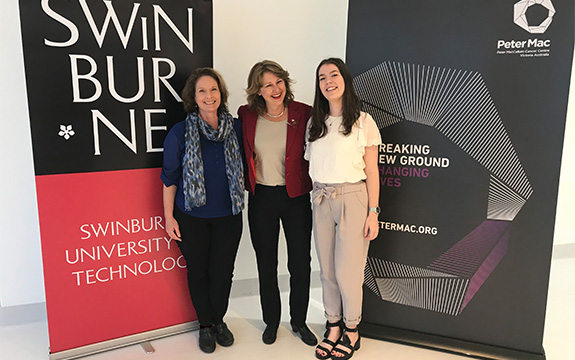Swinburne researcher receives Victorian Cancer Agency funding

In Summary
- Dr Lisa Grech has been granted an Early Career Health Services Research Fellowship
- The $300,000 grant will assess an intervention for patients’ adherence to medication
- The research will be carried out in collaboration with Swinburne’s Iverson Health Innovation Institute and Peter MacCallum Cancer Centre
Swinburne’s Dr Lisa Grech has received a Victorian Cancer Agency research fellowship to assess a program that helps chronically ill patients adhere to their medication regimen.
Dr Grech has been granted a $300,000 Early Career Health Services Research Fellowship to work in collaboration with Swinburne’s Iverson Health Innovation Research Institute and Peter MacCallum Cancer Centre.
The project will assess the SAMSON intervention, a pharmacist and nurse-supported, mobile-health (M-health) intervention to assist patients to take oral cancer medication and manage side-effects.
Dr Grech says this research is critically important to the quality of life and survival outcomes of patients suffering chronic illnesses.
“A World Health Organisation report shows that sub-optimal medication adherence occurs in approximately 50 per cent of patients who need to take long-term medication, including cancer patients,” Dr Grech says.
“Research shows that a complex intervention is required to help ensure patients are supported to take their medication regularly.”
There are many reasons why patients might not stick to a medication regimen, including psychological reasons and not wanting to experience side-effects.
“A comprehensive program such as the SAMSON intervention is important, because it covers areas such as pharmacy and nurse support, as well as using the M-health platform, which reminds patients to take their medication and provides detailed side-effect self-management information,” Dr Grech says.
The Early Career Researcher Health Services Fellowship will fund the assessment of SAMSON for patients needing to take a high cost medication that can have severe side-effects, including nausea and fatigue.
“When faced with the short-term difficulties of taking medication, some patients find it hard to see the long-term benefits. This program is about educating patients of the treatment’s efficacy, helping them to reshape their health beliefs and supporting them to improve their quality of life,” Dr Grech says.
Professor John Seymour, Director of Cancer Medicine and Director of the Department of Haematology at Peter MacCallum, says Dr Grech’s research leverages important multi-disciplinary collaborations to improve knowledge of this complex but critical area of health-care delivery.
“Better understanding the impact of medication on patients’ quality of life and addressing this in an individualised way has the promise to optimise both patient benefit, and community resource utilisation,” Professor Seymour says.
This research will build on the work of Professor Penelope Schofield, who developed and tested the first iteration of this program, REMIND, which was pilot-tested with 10 patients.

